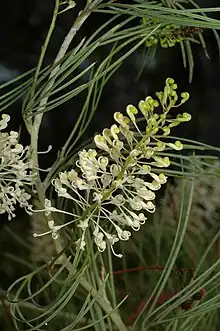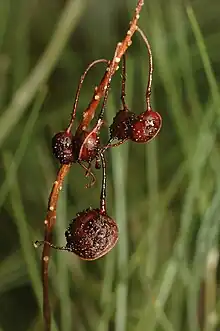| Grevillea zygoloba | |
|---|---|
 | |
| In the Australian National Botanic Gardens | |
| Scientific classification | |
| Kingdom: | Plantae |
| Clade: | Tracheophytes |
| Clade: | Angiosperms |
| Clade: | Eudicots |
| Order: | Proteales |
| Family: | Proteaceae |
| Genus: | Grevillea |
| Species: | G. zygoloba |
| Binomial name | |
| Grevillea zygoloba Olde & Marriott[1] | |


Grevillea zygoloba is a species of flowering plant in the family Proteaceae and is endemic to the south-west of Western Australia. It is an erect shrub with divided leaves, the lobes linear and more or less parallel, and clusters of creamy-white flowers.
Description
Grevillea zygoloba is an erect shrub that typically grows to a height of up to 2 m (6 ft 7 in) and has erect, glaucous branchlets. Its leaves are 50–80 mm (2.0–3.1 in) long and divided with usually 3 to 7, more or less parallel lobes sometimes divided again, the end lobes linear, 30–50 mm (1.2–2.0 in) long and 0.7–1.0 mm (0.028–0.039 in) wide. The edges of the leaves are rolled under, usually concealing the lower surface apart from the mid-vein. The flowers are arranged in leaf axils and on the ends of branches in sometimes branched clusters, the end clusters cylindrical to conical on a rachis 20–40 mm (0.79–1.57 in) long, the flowers nearer the base of the rachis opening first. The flowers are creamy-white, the pistil 6.5–7.5 mm (0.26–0.30 in) long. Flowering occurs from September to November and the fruit is a sticky, pimply, elliptic follicle 5–7 mm (0.20–0.28 in) long.[2][3]
Taxonomy
Grevillea zygoloba was first described in 1994 by the botanists was first formally described by the botanists, Peter Olde and Neil Marriott in 1994 in the Grevillea Book from specimens collected by Olde near Bungalbin Hill near Southern Cross.[4] The specific epithet (zygoloba) means "joined-leaved", referring to the pinnate leaves.[5]
Distribution
This grevillea grows in woodland and scrubland on and among ironstone hills, in stony and loamy soils. It occurs between Koolyanobbing and the Die Hardy Range north of Southern Cross in the Avon Wheatbelt, Coolgardie, Nullarbor and Yalgoo bioregions of south-western Western Australia.[2][3]
Conservation status
Grevillea zygoloba is listed as "not threatened" by the Government of Western Australia Department of Biodiversity, Conservation and Attractions.[3]
See also
References
- ↑ "Grevillea zygoloba". Australian Plant Census. Retrieved 26 April 2023.
- 1 2 "Grevillea zygoloba". Australian Biological Resources Study, Department of Agriculture, Water and the Environment: Canberra. Retrieved 25 April 2023.
- 1 2 3 "Grevillea zygoloba". FloraBase. Western Australian Government Department of Biodiversity, Conservation and Attractions.
- ↑ "Grevillea zygoloba". APNI. Retrieved 26 April 2023.
- ↑ Sharr, Francis Aubi; George, Alex (2019). Western Australian Plant Names and Their Meanings (3rd ed.). Kardinya, WA: Four Gables Press. p. 343. ISBN 9780958034180.